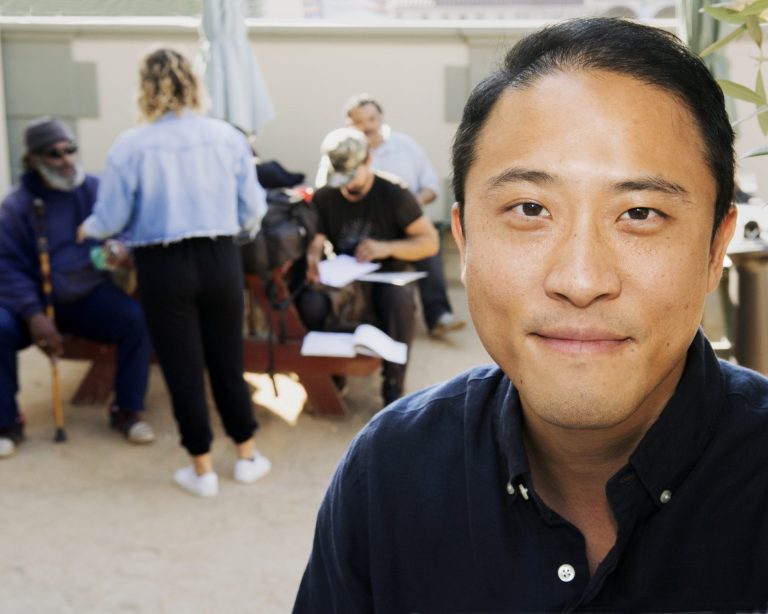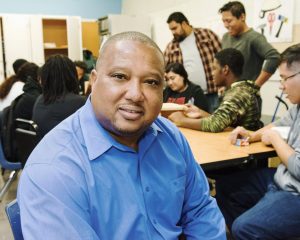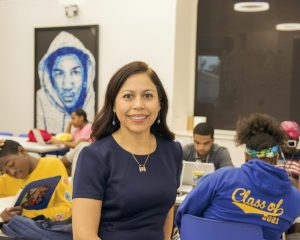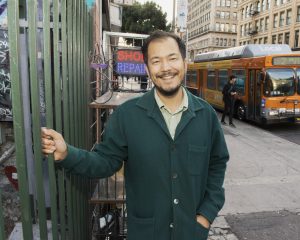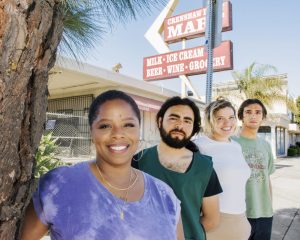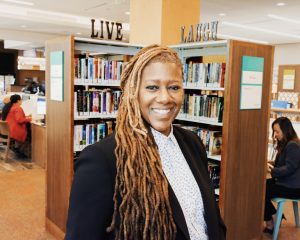Chris Ko is the former Managing Director for Homelessness & Strategic Initiatives at the United Way of Greater Los Angeles, an organization that brings individuals and institutions together to tackle LA’s biggest challenges. He explored how everyday Angelenos can be more meaningfully involved in solving the region’s homelessness crisis. In particular, Chris is interested in new forms of giving and exchange platforms for services as well as support that gives agency and choice back to our homeless neighbors.
* Chris transitioned out of his role at United Way of Greater Los Angeles in 2024.
Fellowship Summary
Where did your inquiry begin? What was your proposed plan?
My inquiry began at a very different place—after having spent a decade working out policy solutions to ending homelessness in LA, I wanted to understand what everyday Angelenos could do to meaningfully be part of the solution.
I was going to spend days outside with my houseless neighbors and nights and weekends with street outreach teams.
The answer to my initial question came pretty quickly: “What could everyday Angelenos do on their own?” Honestly, not much.
Personal care and attention is critical, but it’s also woefully insufficient. Individual efforts to fight back against systems of neglect and exclusion always lead to burnout or disillusionment.
That’s not to say everyday residents weren’t advancing critical care over long periods of time or ending homelessness in very real ways.
But every time they were, they were doing it with others. Inevitably, anyone doing significant work and sustaining that effort had found others to do it with. It sounds so basic, but it’s a critical insight I’d missed in the question of “What can I do to help?”
I’d missed that my original inquiry had sought to answer a phenomenon caused by American exceptionalism with more American exceptionalism.
Where do you stand today?
Today, I am on the other side of the question I began exploring instead—what structures and cultures promote collectivism and cooperation? That inquiry took me through histories of Black America, mutual aid efforts in neighborhoods across Los Angeles, the “social economy” of Seoul, the cooperative policies of Rwanda, the ecosystem of Mondragon, the municipalist movement and superblocks of Barcelona, the social housing infrastructure of Vienna, the ahupua’a land management of Hawaii, and the work of alternative democratic economies in the United Kingdom.
Here’s what I learned:
- Cooperatives need federations, federations need confederations, and all of it requires a broader ecosystem in the same way that people need other people and, ultimately, organizations to sustain their activity and build bigger.
- There is no communal culture that wins against laws and economic models built around Darwinian ideals. Collectivism must be intentionally enabled and strengthened by public policy (e.g., incorporation laws that make it easier for partnerships to form; lending and granting practices that advantage groups vs. individuals).
- Space matters—even in a technological age, the built environment is a critical accelerant or barrier to gathering, association, and ultimately cooperative enterprise.
- Solidarity has practical value—communal and intergenerational living cuts down the practical cost of housing. Community care lessens safety net expenses. Sharing tools lessens waste. Owning together reduces the impossible weight placed on singular owners.
- While we fight back and speak out, we must also build. It is possible to build substantial things despite exclusion. In fact, outright exclusion and oppression are often the context for the most imaginative and beautiful alternative economies that end up rivaling dominant systems.
What does the road ahead look like?
Two years ago, I thought the best we could do was make programs and policies for people of color and immigrants to have a better standing in this economy. Now I believe it is possible to form an entirely new economy.
Los Angeles is full of beautiful examples of land trusts, cooperatives, and mutual efforts that are world class. During the first years of COVID, I felt so lucky that I could learn so much in my own city. But these efforts are still seen as experimental, bohemian, and are not appreciated as viable pathways to making a living or a life. Collectivism is narrowly understood as socialism or often misunderstood as formless consensus and aimless anarchy.
I believe that neighborhoods—especially the ones most divested in—are where the potential for collective solutions most strongly lie. Realities like overcrowding, the digital divide, and fewer transportation options are often given as liabilities. But in economies and enterprises that require relational strength and trust, proximity and density can be transformed into a competitive advantage.
So the road ahead begins with asset maps, strengths surveys, and spend analyses that lift up the economic potential of each neighborhood and its residents. It looks like the creation of neighborhood economics labs that structure latent assets—skills and capital—to come together in cooperative enterprises and shared investments. It looks like aggregating public procurements and private contracts from locally-based anchor institutions and corporations to fuel the growth of local cooperatives. And it looks like investing in public spaces that reinforce the relational bonds that are at the foundation of it all.
This is not just for the benefit of the divested neighborhoods and their residents—as we build an economy that values cooperation and care, it will ultimately be one that does not burn itself or the Earth out in 100 years. May our new economy be one that generates true wealth and prosperity for us all.
The road ahead in the context of my current endeavors: Chris Ko on L.A. and United Way’s Future
